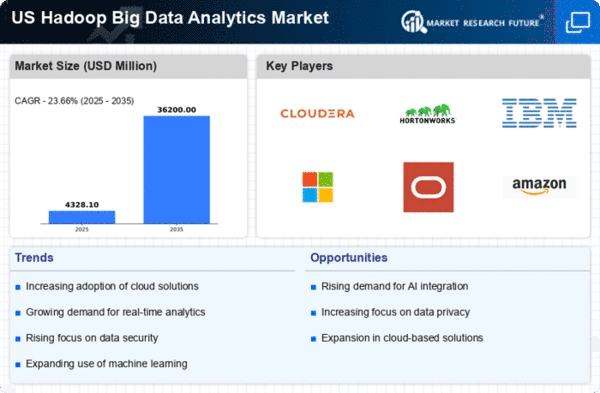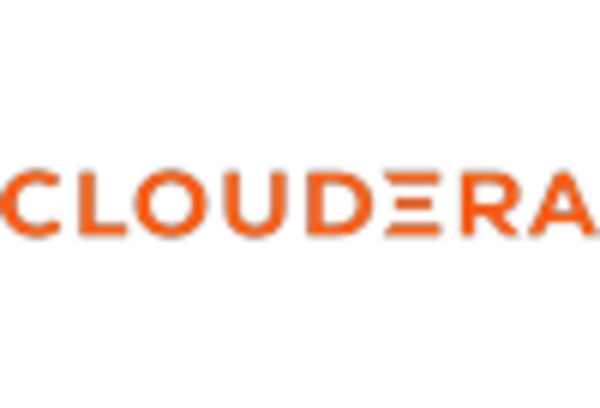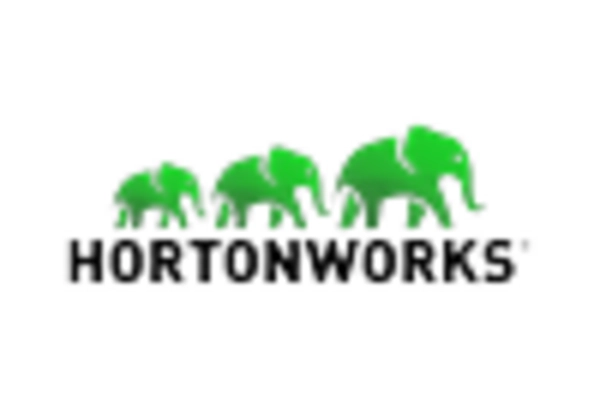Growing Volume of Data Generation
The exponential growth in data generation is a significant driver for the hadoop big-data-analytics market. With the proliferation of IoT devices, social media, and digital transactions, organizations are inundated with vast amounts of data. It is estimated that the total data generated globally will reach 175 zettabytes by 2025. This surge necessitates advanced analytics solutions capable of processing and analyzing large datasets efficiently. Hadoop's distributed computing framework is well-suited for this task, allowing organizations to scale their data processing capabilities. As the volume of data continues to rise, the hadoop big-data-analytics market is poised for substantial growth, as businesses seek effective ways to manage and derive insights from their data.
Increased Focus on Customer Experience
In the competitive landscape of modern business, enhancing customer experience has become a top priority for organizations. The hadoop big-data-analytics market plays a crucial role in this endeavor by enabling companies to analyze customer data and preferences effectively. By leveraging Hadoop's capabilities, businesses can gain insights into customer behavior, personalize offerings, and improve service delivery. This focus on customer-centric strategies is expected to drive market growth, as organizations invest in analytics solutions to better understand and meet customer needs. As a result, the hadoop big-data-analytics market is likely to see increased adoption as companies strive to create more engaging and satisfying customer experiences.
Regulatory Compliance and Data Governance
As data privacy regulations become more stringent, organizations are compelled to prioritize compliance and data governance. The hadoop big-data-analytics market is significantly impacted by this trend, as businesses seek solutions that ensure data security and adherence to regulations such as GDPR and CCPA. Companies are increasingly investing in analytics tools that provide transparency and control over data usage. This focus on compliance is expected to drive market growth, as organizations recognize the importance of maintaining customer trust and avoiding potential penalties. Consequently, the hadoop big-data-analytics market is likely to expand as businesses adopt technologies that facilitate regulatory compliance and enhance data governance practices.
Rising Demand for Data-Driven Decision Making
The hadoop big-data-analytics market is experiencing a surge in demand as organizations increasingly recognize the value of data-driven decision making. Companies are leveraging analytics to gain insights into customer behavior, operational efficiency, and market trends. This shift is evidenced by a projected growth rate of approximately 25% annually in the analytics sector. As businesses strive to remain competitive, the need for robust data processing capabilities becomes paramount. Hadoop's ability to handle vast amounts of unstructured data positions it as a critical tool for organizations aiming to harness the power of big data. Consequently, the hadoop big-data-analytics market is likely to expand as more enterprises adopt these technologies to enhance their strategic initiatives.
Integration of Artificial Intelligence and Machine Learning
The integration of artificial intelligence (AI) and machine learning (ML) into the hadoop big-data-analytics market is transforming how organizations analyze data. AI and ML algorithms can process and analyze large datasets more efficiently, uncovering patterns and insights that were previously unattainable. This trend is expected to drive market growth, with estimates suggesting that AI-driven analytics could increase productivity by up to 40%. As businesses seek to automate processes and improve decision-making, the demand for Hadoop-based solutions that support AI and ML capabilities is likely to rise. This integration not only enhances analytical capabilities but also positions the hadoop big-data-analytics market as a vital component in the digital transformation journey of organizations.
















